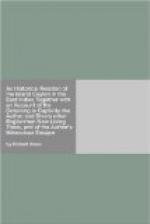In their speech the people are bold without sheepish shame facedness, and yet no more confidence than is becoming.
[Their Language in their address to the King.] The King they call by a name, that signifies somewhat higher than a man, and next to God. But before the Wars they stiled him Dionanxi, which is a Title higher than God by the addition of Nanxi. This Title the King took before the Rebellion, but since he forbad it. When they speak to the King concerning themselves, they do not speak in the first person, and say I did so or so, but Baulagot the limb of a Dog did it or will do it. And when they speak of their Children unto the King, they call them Puppies. As if he ask them how many Children they have, they say so many Puppy dogs, and so many Puppy-bitches. By which by the way, we may conjecture at the height of the King and the slavery of the People under him.
[Words of Form and Civility.] They have certain words of Form and Civility, that they use upon occasion. When they come to another mans house, he asks them what they come for, which is his civility, and they answer Nicamava, I come for nothing, which is their ordinary reply, tho they do come for something. And upon this they have a Fable.
A God came down upon earth one day, and bad all his Creatures come before him and demand what they would have and it should be granted them. So all the beasts and other Creatures came, and one desired Strength, and another Legs, and another Wings, &c. And it was bestowed on them. Then came the White men, the God asked them, what they came for? And they said, they desired Beauty and Valour and Riches. It was granted them. At last came the Chingulays, the God required of them, what they came for. They answered, Nicamava, I come for nothing. Then replyed he again, do you come for nothing, then go away with nothing. And so they for their complement fared worse than all the rest.
When one proffers something as a gift to another, altho it be a thing that he is willing to have, and would be glad to receive, yet he will say, E eppa queinda, No, I thank you; how can I be so chargeable to you? And in the same time while the words are in his mouth, he reacheth forth his hand to receive it.
[Full of words and complement.] Neither are they free or forward to requite them, from whom they have received a gift or good turn, otherwise than with words and windy protestations; the which shall not be wanting. But forwards they are to receive, yet very backward to part with any thing. And if one neighbour asketh ought of another, or to borrow any thing, which the other is unwilling either to give or lend, they never will plainly deny by saying, I cannot or will not; but with dissembling they will excuse themselves, saying, They have it not, or is it lent abroad already, altho it be with them in the house at the same time.
[By whom they swear.] Their usual manner of swearing in protestations, is by their Mother, or by their Children, or by their two Eyes, oftner than by their Gods. But their protestations be they never so deep, and seem they never so serious, they are not to be regarded, as proceeding more from custom than truth.




